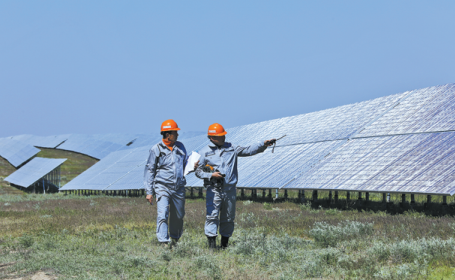Multilateralism key to climate issue


As challenges mount in global climate governance amid complex shifts in the international landscape, cooperation is needed more than ever to tackle climate change issues, a national political adviser said.
Zhang Xingying, a member of the National Committee of the Chinese People's Political Consultative Conference, the nation's top political advisory body, underlined the importance of upholding multilateralism in meeting the climate goals set out in the 2015 Paris Agreement.

As China's representative on the Intergovernmental Panel on Climate Change, the United Nations body that assesses the science related to climate change, Zhang has witnessed the nation's efforts to strengthen partnerships with the international community to address the issue.
"As a significant player in the global response to climate change, China has been endeavoring to promote international cooperation to implement the Paris Agreement and advance the establishment of a fair, reasonable, cooperative and win-win global climate governance system," he said in an interview.
Global climate governance is confronted with many challenges, he said. While countries worldwide acknowledge the severity of climate change, many do not have sufficient political will to take effective measures on climate issues, he said.
"Developed nations, in particular, are reluctant to fulfill their responsibilities to take the lead in emissions reductions, and they also fail to fulfill their commitments to provide financial support to developing countries coping with climate change," said Zhang, who is also deputy director-general of the department of science, technology and climate change at the China Meteorological Administration.
Geopolitical competition and rising unilateralism have also made it more difficult to rally collaborative efforts in addressing climate change, he added.
In order to achieve the goals of the Paris Agreement, Zhang said that countries need to adhere to a multilateral process under the United Nations Framework Convention on Climate Change, uphold the principle of common but differentiated responsibilities, and boost global partnerships.
China has made important contributions to adopting the Paris Agreement and worked actively toward its implementation by adopting vigorous policies and measures.
The country aims to see carbon dioxide emissions peak before 2030 and achieve carbon neutrality before 2060.
China will lower its carbon dioxide emissions per unit of GDP by over 65 percent from the 2005 level before 2030, increase the proportion of non-fossil fuels in primary energy consumption to around 25 percent, and take its total installed capacity of wind and solar power to over 1.2 billion kilowatts.
China has taken a series of measures to cut emissions, including adjusting its economic structure, promoting technological progress, improving energy efficiency and developing renewable energy, Zhang said.
While promoting its own green and sustainable development, China has also engaged in South-South cooperation to address climate change, providing as much support and assistance as it can to developing countries and making a positive contribution to jointly addressing climate change, Zhang said.
China has assisted Bangladesh and the Maldives in establishing extreme weather warning systems to improve the countries' capabilities to forecast climate-related natural disasters, he said.
China has also cooperated with countries such as Pakistan and Kazakhstan, as well as some African states to deal with climate risks and meteorological disasters, Zhang added.
- Big lottery winners in Guangzhou claim prize
- No indication of big earthquake to occur in Ningxia, said officials
- Rural China tackles hefty bride prices to ease marriage burdens
- 8 killed, 15 injured in market fire in North China's Hebei
- 'Ferryman of souls' escorts cremains of veterans from Taiwan to mainland home
- China announces month-long online shopping event for Spring Festival





































